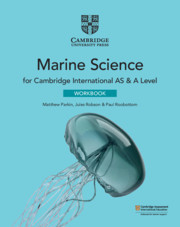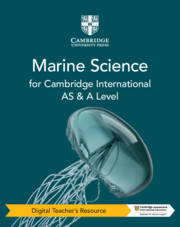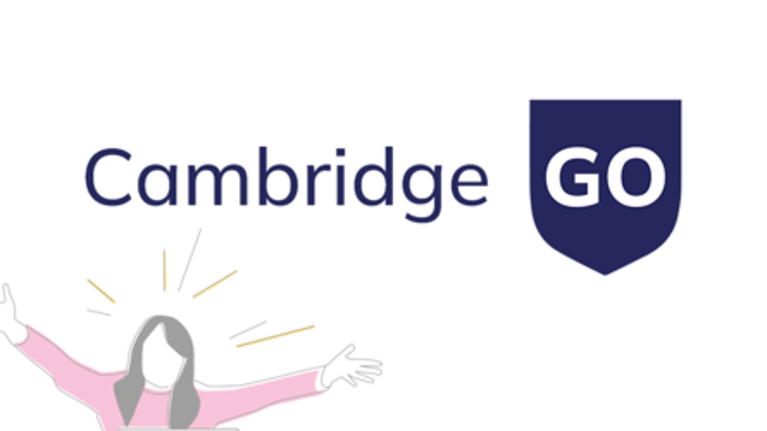Cambridge International AS & A Level Marine Science Workbook
Overview
Explore the wonders of the underwater world and develop theoretical and practical marine science skills. Following extensive classroom research, this workbook has been revised by experienced teachers and examiners. The first section of the workbook includes exercises and exam-style questions for each topic to enable students to consolidate and assess their learning and apply their knowledge to novel situations. The second section includes 27 practical activities to develop students’ investigative skills. Support notes and sample data are provided in the teacher’s resource. Written in accessible language for the international learner this book helps students build confidence and develop essential skills. This Workbook is designed to support the coursebook, with specially selected topics where students would benefit from further opportunities to apply skills, such as application, analysis and evaluation in addition to developing knowledge and understanding. (The workbook does not cover all topics in the Cambridge International AS & A Level Marine Science syllabus (9693)).
Features
- The perfect companion to the coursebook to help students develop their theoretical and practical skills
- Includes exercises and exam-style questions for each topic to help students assess, consolidate and apply their learning
- Includes 27 practical activities to help students develop their investigative skills
- Written in accessible language to support international learners
Contents
- Introduction
- Section 1
- Chapter 1: Water
- Exercises
- Exam-style questions
- Chapter 2: Earth processes
- Exercises
- Exam-style questions
- Chapter 3: Interactions in marine ecosystems
- Exercises
- Exam-style questions
- Chapter 4: Classification and biodiversity
- Exercises
- Exam-style questions
- Chapter 5: Examples of marine ecosystems
- Exercises
- Exam-style questions
- Chapter 6: Physiology of marine organisms
- Exercises
- Exam-style questions
- Chapter 7: Energy
- Exercises
- Exam-style questions
- Chapter 8: Fisheries for the future
- Exercises
- Exam-style questions
- Chapter 9: Human impacts on marine ecosystems
- Exercises
- Exam-style questions
- Section 2
- Chapter 1: Water
- Practical 1.1 Properties of water
- Practical 1.2 pH
- Practical 1.3 Salinity and temperature gradients
- Chapter 2: Earth processes
- Practical 2.1 Investigating the effect of temperature on the solubility of a salt
- Practical 2.2 Modelling weathering and erosion
- Practical 2.3 Interpreting tide tables
- Chapter 3: Interactions in marine ecosystems
- Practical 3.1 Pyramids of numbers and biomass
- Practical 3.2 Planning an investigation to estimate the productivity of an aquatic producer
- Practical 3.3 Investigating the carbon cycle
- Chapter 4: Classification and biodiversity
- Practical 4.1 Constructing a dichotomous key
- Practical 4.2 Using quadrats to estimate abundance of organisms
- Practical 4.3 Estimating a population size using the mark-release-recapture method
- Chapter 5: Examples of marine ecosystems
- Practical 5.1 Drawing an animal found on a sandy shore
- Practical 5.2 Planning an investigation into the effect of light intensity on coral growth
- Practical 5.3 Distribution of organisms on a Rocky Shore
- Chapter 6: Physiology of marine organisms
- Practical 6.1 Observing, drawing and comparing the structures of respiratory systems
- Practical 6.2 Investigating the effect of salinity on brine shrimp
- Practical 6.3 The effect of salt solution on eggs
- Chapter 7: Energy
- Practical 7.1 Identification and separation of photosynthetic pigments using paper chromatography
- Practical 7.2 Data analysis into limiting factors for photosynthesis
- Practical 7.3 Gas exchange in an aquatic producer
- Chapter 8: Fisheries for the future
- Practical 8.1 Determining of size of reproductive maturity to inform minimum catch size
- Practical 8.2 Effect of temperature on growth of whelk
- Practical 8.3 Planning an investigation into the effect of feeding rates on the growth rates of salmon
- Chapter 9: Human impacts on marine ecosystems
- Practical 9.1 Planning an investigation into marine plastics pollution
- Practical 9.2 Modelling the greenhouse effect
- Practical 9.3 Monitoring invasive species
- Glossary
- Index
Brighter Thinking Blog
Keep up to date with the latest classroom tips and educational trends from our brighter thinkers.
Visit the blogCatalogues and Ordering
Looking for something in particular or just browsing? View our catalogues to see our full range of print and digital books.
View and downloadAdvice on useful tools
Advice on useful tools, activities and timetabling from teachers experiencing school closures.
Cambridge GO
All our supporting resources have now moved to Cambridge GO – the new home for your Cambridge digital content.
Listen to our podcast
Listen to our podcast to discover teaching inspiration & advice from leading educational thinkers.






